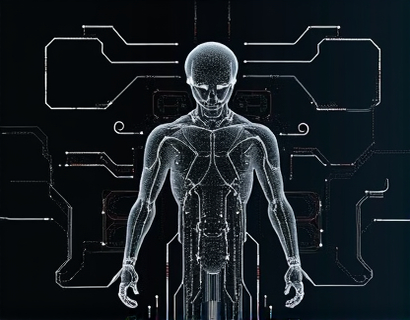AI Accreditation Dynamics: Unlocking Career Potential with Specialized Digital Certifications
The integration of Artificial Intelligence (AI) in various sectors has revolutionized the way we approach education and career development. One of the most significant advancements in this domain is the emergence of AI-driven accreditation platforms that offer specialized digital certifications. These certifications are designed to validate specific skills and educational achievements, thereby enhancing job prospects and educational credentials in the tech industry. This article delves into the dynamics of AI accreditation, exploring how these digital certifications can unlock new career potentials and elevate professional standing.
The Rise of AI-Driven Accreditation
The traditional certification processes, while valuable, often struggle to keep pace with the rapid advancements in technology. AI-driven accreditation platforms address this gap by providing a more dynamic and flexible approach to validating skills. These platforms leverage AI algorithms to assess and certify a wide range of competencies, from basic programming skills to advanced data science techniques. The key advantage of this approach is the ability to offer timely and relevant certifications that align with current industry demands.
Benefits of Specialized Digital Certifications
Specialized digital certifications offered by AI accreditation platforms come with numerous benefits. Firstly, they provide a clear and tangible proof of one's skills, which is increasingly important in a job market where employers seek concrete evidence of a candidate's capabilities. Secondly, these certifications are often industry-recognized, enhancing the credibility of the holder in the eyes of potential employers. Lastly, they offer a cost-effective and efficient way to upskill or reskill, allowing professionals to stay competitive in a rapidly evolving tech landscape.
Validation of Skills
One of the primary functions of AI-driven certifications is to validate specific skills. Unlike general degrees or certifications, these digital credentials focus on particular competencies that are directly applicable to real-world tasks. For instance, a certification in machine learning algorithms or natural language processing can demonstrate a deep understanding of these areas. This granular approach ensures that employers can trust the certified individual's ability to perform specific tasks, thereby reducing the risk of hiring mismatches.
Enhancing Job Prospects
In the tech industry, having the right certification can significantly enhance job prospects. Employers often use certifications as a screening tool to filter candidates, especially for specialized roles. By obtaining certifications from reputable AI accreditation platforms, individuals can distinguish themselves from the competition. Moreover, these certifications can open doors to new opportunities, such as advanced roles or higher salary potentials, by demonstrating a high level of expertise in a particular area.
The Role of AI in Certification Processes
The use of AI in certification processes is multifaceted. AI algorithms can automate the assessment of practical tasks, providing immediate feedback and ensuring consistency in evaluation. This not only speeds up the certification process but also ensures fairness and accuracy. Additionally, AI can analyze market trends and skill gaps, helping to design certifications that are in high demand. This proactive approach ensures that the certifications remain relevant and valuable to both individuals and employers.
Personalized Learning Paths
AI-driven accreditation platforms often offer personalized learning paths based on an individual's current skill level and career goals. By assessing the user's existing knowledge and identifying gaps, the platform can recommend specific courses and certifications to help bridge those gaps. This personalized approach not only makes the learning process more efficient but also more engaging, as learners can focus on areas that are most relevant to their career aspirations.
Educational Credibility and Continuous Learning
Beyond job prospects, AI-driven certifications play a crucial role in continuous learning and professional development. The tech industry is characterized by its constant evolution, and professionals must continually update their skills to remain relevant. Digital certifications provide a structured way to engage in lifelong learning, ensuring that individuals stay up-to-date with the latest technologies and methodologies. This commitment to continuous improvement not only benefits the individual but also contributes to the overall advancement of the industry.
Building a Reputable Portfolio
Digital certifications can also serve as key components of a professional portfolio. In the tech industry, a well-curated portfolio that includes relevant certifications can be a powerful tool for showcasing one's expertise. Employers and hiring managers often review portfolios to gauge a candidate's practical skills and commitment to professional development. By incorporating AI-driven certifications into their portfolios, professionals can present a comprehensive and credible picture of their capabilities.
Challenges and Considerations
While AI-driven certifications offer numerous advantages, there are also challenges and considerations to keep in mind. One of the primary concerns is the credibility and recognition of these certifications. It is essential for accreditation platforms to establish partnerships with industry leaders and ensure that their certifications are widely recognized. Additionally, the quality and rigor of the certification processes must be maintained to prevent the dilution of credentials.
Regulatory Compliance
Another important aspect is regulatory compliance. As the use of AI in certifications grows, regulatory bodies may impose standards and guidelines to ensure fairness and integrity. Accreditation platforms must stay informed about these regulations and adapt their practices accordingly. This proactive approach helps maintain the trust and credibility of the certifications in the eyes of both employers and regulatory authorities.
Future Trends in AI Accreditation
The future of AI accreditation is promising, with several trends shaping the landscape. One notable trend is the integration of blockchain technology to create immutable and transparent records of certifications. This ensures that credentials are tamper-proof and easily verifiable, adding another layer of trust and security. Additionally, the use of AI to predict future skill demands and design preemptive certifications will become more prevalent, helping professionals stay ahead of the curve.
Collaboration and Standardization
Collaboration between accreditation platforms, educational institutions, and industry players will be crucial in standardizing certifications and ensuring their widespread acceptance. By working together, these stakeholders can develop a unified framework for digital certifications, making it easier for professionals to gain recognition across different regions and industries. This standardization will also facilitate the creation of more comprehensive and diverse certification offerings.
Conclusion
AI-driven accreditation platforms are transforming the way individuals validate their skills and enhance their career prospects in the tech industry. By offering specialized digital certifications, these platforms provide a flexible, efficient, and credible way to demonstrate expertise. As the tech landscape continues to evolve, the importance of such certifications will only grow, making them an essential tool for professionals looking to succeed in a competitive market. Embracing these advancements can unlock new opportunities and pave the way for a more skilled and adaptable workforce.










































